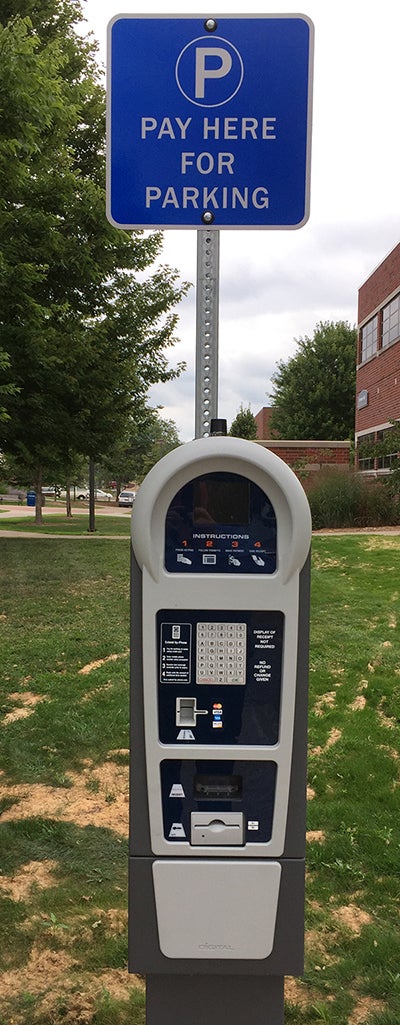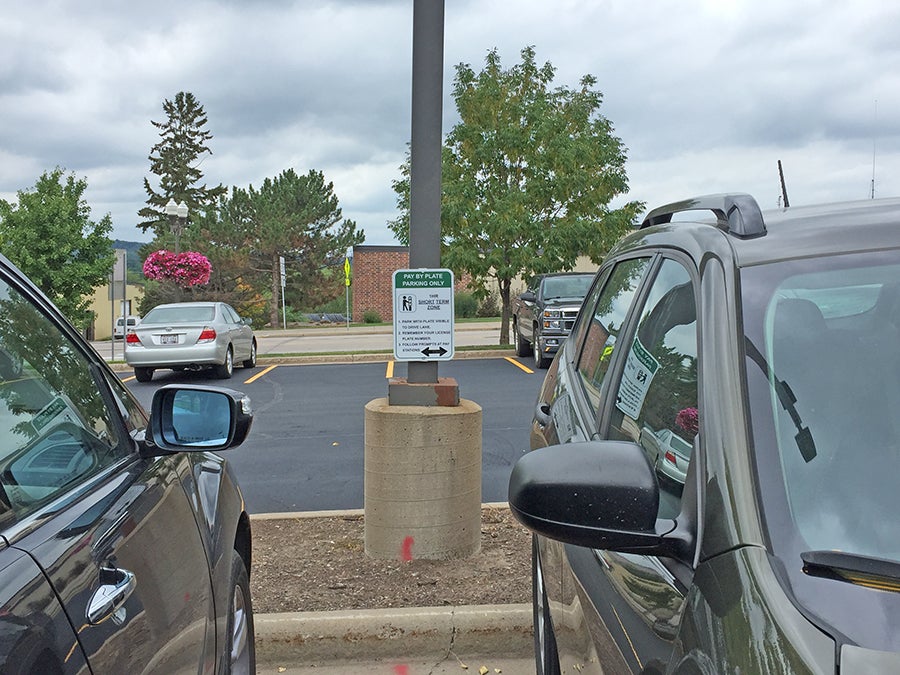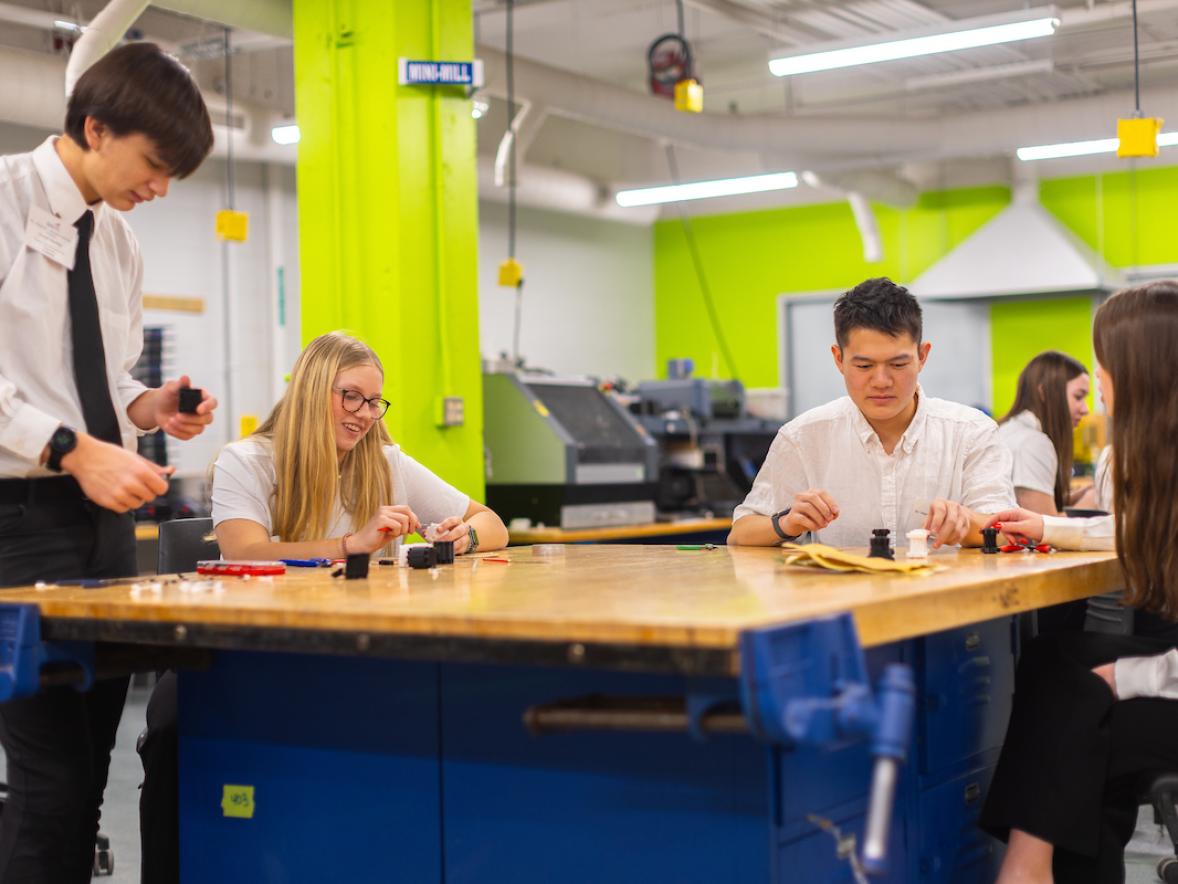University of Wisconsin-Stout parking has changed over the summer.
Gone are almost all of the university parking meters for guest or short-term parking, replaced with an electronic parking station system.
 Short-term parking is available in the lots on the east side of Johnson Fieldhouse, south side of the General Services Building and in the lot near Sorensen Hall. A special pay-to-park zone is behind Jarvis Hall and short-term pay-to-park zone near Sorensen Hall.
Short-term parking is available in the lots on the east side of Johnson Fieldhouse, south side of the General Services Building and in the lot near Sorensen Hall. A special pay-to-park zone is behind Jarvis Hall and short-term pay-to-park zone near Sorensen Hall.
A total of 90 parking meter spots have been removed from the lots. Those parking in the lot, who do not have university annual parking permits, must go to a pay station and purchase the time needed in the lots versus plugging a parking meter with coins.
Pay stations are in the middle of the lot near the west entrance to Sorensen Hall, the west side of the drive lane near Jarvis Hall Science Wing, near the General Services Building just off Broadway Street, near the east entrance to Johnson Fieldhouse and across 13th Avenue near the Applied Arts Building.
License plate numbers must be entered in the pay stations to park. The stations accept cash or debit/credit cards. Cost of parking is $1 per hour.
Parking is regulated all year, but many parking lots are free for the public from 4 p.m. to 2 a.m. weekdays and on weekends.
The goal of the change is to improve customer service to those using university parking lots, said UW-Stout Police Chief Jason Spetz.
“If you pay with a credit card, you have the option of extending parking by phone,” Spetz said. “If you place your 10-digit phone number into the machine and you have 10 minutes left in the space, the system will send you a text message telling you the meter is about to expire and give you the option to extend your minutes. We want to try and cut down on the number of violations based on expired time.”
The lots near the General Services Building and Johnson Fieldhouse will be for longer-term parking. About 10 spaces near Sorensen Hall will be for short-term parking.
The new pay stations allow the parking office to know when a vehicle arrived, when time expired and when a citation was issued, allowing them to quickly void any citations that were written in error, Spetz said. Parking violations for unauthorized parking are $20 per incident.

As part of the new system, parking services will have equipment that reads license plate numbers with an infrared camera. License plates must be visible from driving lanes in the parking lots. Staff and students will still be able to purchase annual permits, but this will be the last year they receive a physical permit.
License plate numbers will be recognized as valid for parking. More than one plate can be registered with the parking office, but only one vehicle can be parked on campus at a time.
The new system is estimated to save $31,000 a year and will return on the investment in new equipment within three years, Spetz said. “No one wants to pay more for their annual permit cost,” Spetz said. “This is going to help save revenue and help keep permit cost as low as possible for as long as we can.”
The new system will keep track of the number of vehicles in campus lots and where parking is in demand. It will allow for the better management of parking and occupancy rates, Spetz said.
For example, in parking areas near residence halls that are in high demand, officers can keep track if students have left the university and did not turn in their permits and then offer parking spots to other students on a waiting list.
The university still has about eight parking meters near Merle M. Price Commons, Wigen Hall and Antrim-Froggatt-McCalmont Halls for short-term parking.
For questions or more information on parking at UW-Stout, go to the Parking Services website.
UW-Stout is Wisconsin’s Polytechnic University, with a focus on applied learning, collaboration with business and industry, and career outcomes.
###
Photos
UW-Stout Police Chief Jason Spetz, at left, with Community Service Officer Ethan Kjellberg near one of the new parking pay stations.
The new pay station system is estimated to save $31,000 a year.
To use the new pay stations a license plate number is required. Parking spots can be renewed through a smartphone app.







